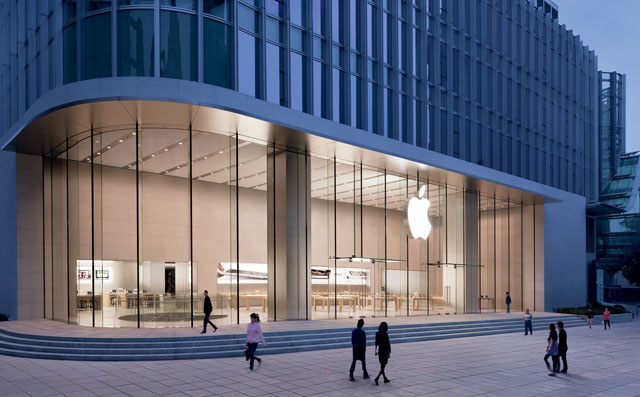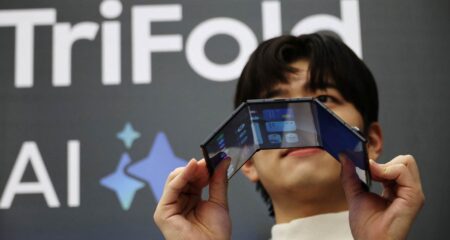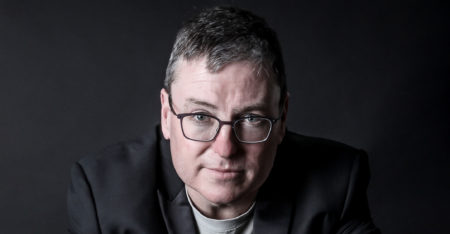
The frayed scrap of paper taped to the sidewalk outside Apple’s flagship store in San Francisco’s Union Square had a simple message: US$5 for photographs.
The sight of Apple fans clamouring to get the latest phone was replaced on Friday by people looking to make a few bucks from their lead spot in the line. For the first time, being first through Apple store doors around the world is no guarantee of securing the top-of-the-line new iPhone. A combination of limited supply and Apple’s push toward online pre-orders meant walk-in customers were unable to buy the larger 7 Plus version.
The result: smaller, less-enthusiastic lines. That’s a big change from the retail frenzy that has long been a ritual of the company’s marketing for a product that still accounts for at least 57% of revenue.
“My iPhone 5 died two days ago, the screen became detached,” said David Nelson, a 51-year-old attorney from Oakland, California, who waited toward the back of a line of several hundred people outside the San Francisco store on Friday morning. “If my phone had survived, I wouldn’t be here.”
It was subdued outside the London Apple shop in Covent Garden. A well-organised line of a few hundred people cycled through, mainly consisting of people with receipts to pick up pre-ordered devices.
The line outside Apple’s Fifth Avenue store in New York was the smallest since the launch of the iPhone 3GS in 2009, according to Piper Jaffray analyst Gene Munster. His research team counted 400 customers lining up there Friday, down from a peak of 1 880 for the iPhone 6 debut in September 2014. Apple said earlier this week that all models of the 5,5-inch screen iPhone 7 Plus were sold out in advance, as were all other new handsets with the glossy jet black finish.
“Consumers continue to trend toward pre-ordering new devices to specifically avoid long launch day lines,” Munster wrote in a Friday note to investors. “Pre-orders and early inventory issues will continue to impact future launch day lines, thus would not be surprised to continue seeing smaller lines across the world on future launch days.”
This year, Apple extended its iPhone upgrade programme, in which customers pay a monthly fee in return for a new handset every year. This may help Apple stabilise iPhone sales in years without new blockbuster models, but it also reduces the need for people to gather for hours outside stores on launch day. After being introduced in the US a year ago, iPhone upgrade was rolled out to the UK and China this year.
Several Apple retail employees in Europe said their stores had no stock for customers walking in without a pre-order reservation, despite Apple’s statement that there would be iPhone 7s available in all colours besides jet black. At European stores where stock for walk-ins was available, quantities were scarce and customers seeking a particular colour and capacity configuration ended up with a model they didn’t want or left empty-handed, the employees said.

Some big Apple stores in California received fewer than 100 units for walk-in customers, other employees said. They didn’t want to be identified sharing descriptions of early sales. Apple won’t disclose initial weekend sales numbers for the new models, breaking with the tradition of past years.
Far cry
The lack of sizable crowds this year is a far cry from previous product launches. The first iPhone in 2007 introduced the world to customers camping outside stores to buy a new technology product. Greg Packer, a former government maintenance worker, started the line at Apple’s Fifth Avenue store five days before the original iPhone became available, while a group of organic farmers sat in line for more than a week before the iPhone 3G’s launch in 2008.
Lines at some malls were so long that security guards made crowds wait at nearby locations and escorted customers in small groups to the store to buy their phones. Apple employees provided waiting customers with bottled water, coffee and donuts.
The large crowds were not only made up of shoppers. Some people paid others to line up for them and re-selling new iPhones purchased early from stores became a thriving side business.
Piper Jaffray’s Munster said this year’s line outside the Fifth Avenue store had “little to no representation from overseas re-sellers.” Last year, these entrepreneurs accounted for about 20 percent of the line, he noted.
Still, smaller lines do not necessarily mean fewer sales, because online pre-ordering has picked up, the analyst said. “We remain comfortable with our thinking for slight growth in the iPhone 7 cycle compared to the iPhone 6 cycle,” he wrote.
Back in San Francisco on Friday, some customers were still waiting to get phones for other people. Matic Skok, a 23-year-old from Slovenia, was buying an iPhone 7 for his uncle back home.
“My uncle is addicted to his iPhone,” Skok said, adding that he didn’t plan to buy a new handset for himself. “I have a 5S but it’s too expensive for me to get a new one.” — (c) 2016 Bloomberg LP




